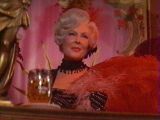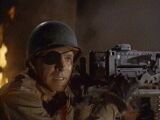Castle Keep
1969 US
Dir: Sydney Pollack
Str: Burt Lancaster, Peter Falk, Patrick O'Neal, Jean-Pierre Aumont
Left:Burt Lancaster, Right:Patrick O'Neal
Detached feeling of Castle Keep has its own charm. Probably, this
movie could be classified as a kind of cult movie.
This rather schizophrenic movie, nevertheless, has its own charm. Actually,
the movie handles the battle of the Ardennes, so-called the battle of bulge, the last offensive of the Nazi Germany.
However, as the first half of this movie depicts very personal matters comically and surrealistically, you will
certainly be perplexed if you are expecting an action-packed war movie for this one. Although there are tremendously
devastating and violent battle scenes in the last part, even those scenes, as I will explain it later, seem to
be quite different from the ones of usual war movies. For this reason, "Castle Keep" is definitely
not a movie for everyone, not even for the audience who usually like war movies. Briefly saying, the movie could
be classified as a kind of cult movie. Although I was thinking the director Sydney Pollack usually made more realistic
movies, this one is completely opposite to being called realistic; that is, very abstract despite the fact that
the background is based on a real historic event. But, anyway, in spite of all of this, I like "Castle Keep"
very much, though, as I said before, I can't recommend this one to everyone. Even I know some reviewers are criticizing
it on the ground that its plot is completely incongruous and utterly schizophrenic. But, I guess that the incongruity
of the plot would be rather intentional in this movie's case. However, I don't mean by saying so that the movie
is explicating the hollowness and the futility of war by showing its audience craziness through the incongruity
of the plot, for it would require as much feeling of reality as it could possibly muster for a movie to successfully
convey the feeling of the hollowness and the futility of war. For example, you may recall the first half of the
movie "Full Metal Jacket"(1987), where the feeling of reality is tactfully established through the realistic
and meticulous depiction of training scenes of young soldiers, by way of which whatever the messages presented
in the latter half is made look more realistic, apart from whether or not it is actually successful. And another
example, "The Deer Hunter"(1978) . The first one third of "The Deer Hunter" depicts ordinary
lives of young men who are to be conscripted to the army in the Vietnamese War. It is quite understandable that
through the emotional involvement in these young men, the latter half of the movie should surely become more dreary
than without it. Showing only devastating battle scenes or the weird Russian roulette scene wouldn't be sufficient
enough to be effective for conveying powerful anti-war messages. In short, without any emotional involvement or
empathy to a certain character or characters, it would be difficult for the audience to form the sense of reality,
and, for that matter, such kind of emotions like hollowness and futility too. Conversely, since Castle Keep's abstractness
seems to prevent its audience from forming emotional involvement in any of the characters appearing in it, it's
extremely difficult for its audience to conjure up concrete emotions by watching it. In addition, the gap between
the first half that is mainly comprised of comedic performances and the latter half that is quite exclusively comprised
of devastating battle scenes is so vast that retaining an consistent view point throughout the entire movie is
absolutely impossible. By the same token, it also becomes extremely difficult for its audience to get from the
movie some consistent messages such as an anti-war message we could find in the movies I mentioned above. Anyway,
to explain the peculiar nature of this movie, next I am going to explain the plot.
There appear dozens of peculiar and weird persons in this movie.
Can you believe there is actually such a soldier who suddenly
becomes a baker right in the middle of a battle field?
The movie has Burt Lancaster as a leader of a squad stranded somewhere in the
Ardennes Forest Belgium in WW2. One day, he finds a castle that he thinks is located upon in a strategically very
important location that is not necessarily a common view shared with all his members. This castle has many precious
historic art works guarded by the master (played by Jean-Pierre Aumont). Lancaster decides to defend the American
war front there. But, this doesn't necessarily mean he has an intention of defending those precious art works.
On the contrary, rather it means all of the treasures might as well be lost in the course of the defending action.
On the other hand, all his men seem to be very peculiar and weird. A sergeant whose previous job was a baker (played
by Peter Falk) suddenly becomes a baker the moment he has found a bakery in the battle field. A soldier falls in
love with a Volkswagen, and divulge to Burt Lancaster his peculiar theory of Volkswagens' incomparable capability
to propagate themselves like cockroaches in the harsh conditions of wartime. Another soldier has a motive to become
a writer by whose retrospective view as a writer the whole story is told. A captain (played by Patrick O'Neal)
tries to hold a lecture about historic art works for the soldiers right in the middle of the battle field in vain.
There is even a wartime evangelist (played by Bruce Dern), though he is not one of Lancaster's men. Thus, all the
major characters appearing in this movie including Burt Lancaster himself are more or less weird and unrealistic.
There is neither an obligatory heroic war veteran, nor a shell shocked greenhorn shaking under the intense bombardment
of German artillery here. The most surrealistic scene of the first half comes when Peter Falk suddenly shoots to
kill a young German soldier who has tried peacefully to contact one of the men of Lancaster's squad (played by
Tony Bill) who was playing the handmade flute. Even this violent scene that otherwise would have been tremendously
brutal has completely detached feeling by the abstract ambiance of the entire movie. Likewise, devastating battle
scenes of the last part even have emotionally detached feeling. The more devastating scenes become, the more the
movie itself becomes abstract, such kind of movie this movie is. In this point, "Castle Keep" certainly
has its strange appeal. Improper as it may seem to be to use such a word considering the subject, this movie, nonetheless,
is definitely fantastic, with being from all the scenes their own layer of reality completely stripped off. Additionally
saying, the music composed by the French genius Michel Legrand seems to be augmenting fantastic and, at the same
time, extremely abstract atmosphere considerably. Anyway, the story finally plunges into the final devastating
battle scenes, where all of the members of the squad including Burt Lancaster but the aforementioned writer and
possibly Peter Falk who finally goes back to the bakery are slaughtered by German onslaught.
All of the scenes of this movie are tinged with schizophrenic
atmosphere. But, anyway, I guess this schizophrenic feeling would
be rather intentional.
Then, what makes this weird movie attractive at least to me? As I said before,
one answer probably lies in the abstractness this movie boasts. By this abstractness, the movie seems to have succeeded
in cutting off any emotional involvement, and attaining highly detached feeling as I said repeatedly. It's like
seeing contemporary art works. Furthermore, constant inconsistency in the plot and the overall ambiance is strengthening
this detached feeling. As I said before, criticism put forth by some reviewers who consider Castle Keep's plot
as incongruous and schizophrenic is utterly true. But, I guess that very trait is intentional and it, nevertheless,
constitutes the forte of this movie. Put it differently, "Castle Keep" doesn't concern continuity
of a plot at all, and all of the scenes are put into where they are, just aiming at momentary effects. I sometimes
wonder why consistency in a plot is required when someone tells a story. As I said in the review of the movie "Murder
by Death", everyday life is not necessarily consistent at least from the view point of the person involved
in a certain situation. Hence, there can be such kind of novels like the ones written by famous novelist Kafka
as extreme cases. In these novels, obscurity dominates, and no transparency of a linear plot is present. Therefore,
there is no reason for that we should rule out the possibility of the presence of movies whose plot is utterly
incongruous and schizophrenic. Speaking of schizophrenia, you will certainly be able to sense an intense schizophrenic
feeling by watching the scene where several soldiers goes to a brothel, and the moment they open the door, crazy
sound and shocking-pink cocktail light burst into your ears and eyes. More or less, all of the scenes are tinged
with this kind of schizophrenic atmosphere. For example, even the devastating last battle scenes are also unrealistically
schizophrenic. The Germans bring fire trucks to the battle field. Most of the aforementioned soldiers dies in a
rose garden. Peter Falk suddenly goes back to the bakery he found. The dressed-up niece of the guardian of the
castle is always hanging around even under such a harsh condition where the fierce battles are interminably going
on. By all these scenes, total chaos dominates. Of course, you can say, in wartime, chaos dominates. But I'm saying
here that chaos dominates as a very scheme of the movie itself. In real world, it is possible for some soldiers
to die in a rose garden, and also possible for a dressed-up girl hanging around a battle field. Nevertheless, in
a fiction, showing such scenes could entirely ruin the plausibility and the integrity of its plot. "Castle
Keep" is a very unusual movie. It precludes its audience from being deeply involved in emotional situations,
even if it depicts devastating and cruel battle scenes. Such an unusual tendency would certainly become both the
forte and the deficiency depending on the view point of the person who evaluates it. For this reason, I said "Castle
Keep" couldn't be a movie for everyone. Even so, I can guarantee just one thing; that is, those who
like surrealistic movies or cult movies will surely like this odd movie too.







